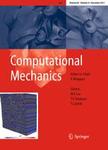版权所有:内蒙古大学图书馆 技术提供:维普资讯• 智图
内蒙古自治区呼和浩特市赛罕区大学西街235号 邮编: 010021

作者机构:Katholieke Univ Leuven Dept Mech Engn Celestijnenlaan 300 B-3001 Heverlee Belgium Flanders Make E2E Core Lab Celestijnenlaan 300 B-3001 Heverlee Belgium SIM M3 program Technol Pk 935 B-9052 Zwijnaarde Belgium
出 版 物:《COMPUTATIONAL MECHANICS》 (计算力学)
年 卷 期:2024年第73卷第6期
页 面:1401-1419页
核心收录:
学科分类:08[工学] 0701[理学-数学] 0801[工学-力学(可授工学、理学学位)]
基 金:Flanders Innovation & Entrepreneurship Agency SIM (Strategic Initiative Materials in Flanders) VLAIO (Flanders Innovation & Entrepreneurship Agency) KU Leuven research fund - research Foundation - Flanders (FWO) Flemish Government - department EWI
主 题:Model Order Reduction Selective Laser Melting Non-linear heat transfer Parametric ECSW
摘 要:This work investigates the application of Model Order Reduction (MOR) to the case of a non-linear heat transfer simulation, which pertains to Selective Laser Melting (SLM). A hyper-reduction strategy, relying on the Energy Conserving Sampling and Weighting (ECSW) method, is presented before being implemented within an adaptative POD-Greedy algorithm to build a more general reduced order base composed of versatile thermal modes. To this end, an a-posteriori error estimator is used alongside Ordinary Kriging to evaluate the degree of error committed during the parametrized-MOR process. The approach introduces a novel scheme called parametric Energy Conserving Sampling and Weighting (pECSW), which extends the applicability of the sparse selection of finite elements for larger parametric ranges than what is possible with the regular ECSW approach. Hence, the generic property of the final layout avoids launching an optimization strategy for new model analysis.